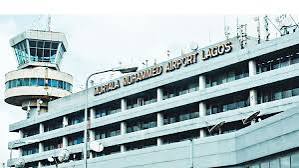The Federal Airports Authority of Nigeria (FAAN) is set to deploy new artificial intelligence (AI)-powered security machines at the Murtala Muhammed International Airport (MMIA) in Lagos.
The Director of Aviation Security Services (DASS) at FAAN, Afegbai Igbafe, announced that the installation of the machines and monitors is almost complete, and customs tables will soon be removed.
Igbafe made this statement during an interview with newsmen at the airport. He explained that the new machines would be equipped with six different monitors, one for each of the six agencies at the airport, allowing officials to monitor baggage directly from their screens.
Read Also:Aviation Authority Remits N218bn to Federal Government’s Coffers
The FAAN official stated, “The tables you see will be a thing of history; you will not see any table here. There will be no physical contact, because what we are also doing is that when we fix those monitors and the machines dictate unaccepted objects, the concerned officials will take the passenger and his or her baggage to designated areas for physical checks.”

The designated areas for physical checks will also be equipped with CCTV cameras to ensure that passengers are not exploited. When the machines detect suspicious items, the Aviation Security (AVSEC) will alert relevant agencies, such as the National Drug Law Enforcement Agency (NDLEA), Customs, and Quarantine, to follow up.
Igbafe also highlighted the importance of collaboration between AVSEC and the NDLEA in terms of drug investigation. He noted that the new machines would be able to detect drugs that the old machines could not, and that FAAN would provide training to security agencies on how to use the new equipment.
The Head of Department, ICT at MMIA, Chima Oge, explained that one of the new machines, the Orion 927DX, would help expedite the identification of organic materials. Oge stated, “It has features that would help with the identification of organic materials accurately and quickly, either in range mode, which highlights the areas based on the range selected by the operator, and/or in interactive mode which provides the operator the option to display the areas based on the value of the pixel.”
However, not everyone is convinced that the new machines will solve all the security issues at the airport. Aviation security analyst Group Captain John Ojikutu (retd) faulted the acquisition of the machines, questioning whether they would stop foreign airlines from conducting secondary hold-baggage screening.
Ojikutu asked, “Would this stop the foreign airlines from stopping their secondary hold-baggage screening? I very much doubt it. The machine cannot work alone but is operated by someone. The machine may be TSA approved, but have the foreign airlines discarded secondary screening for their hold-luggage or checked-in luggage and are now relying on the FAAN baggage screening?”
The new machines are part of FAAN’s efforts to upgrade the airport’s security systems. The authority has been working to improve the efficiency and effectiveness of its security protocols, and the deployment of the new machines is seen as a significant step in this direction.
The introduction of the new machines is expected to enhance the airport’s ability to detect and prevent security threats. With the new technology, airport officials will be able to identify suspicious items more quickly and accurately, reducing the risk of security breaches.